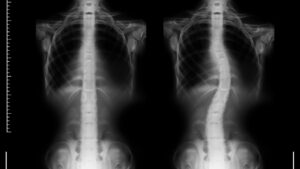
Shoulder pain is something many of us face, especially with modern lifestyles that often involve long hours sitting at desks or looking down at our smartphones. However, not everyone realises that their shoulder pain may actually be originating from the neck. It might sound surprising, but there is a strong link between neck problems and shoulder discomfort. If you are suffering from persistent shoulder pain, understanding the potential connection to your neck could be the first step towards finding relief.
Understanding the anatomy: how your neck and shoulders are connected
The neck and shoulders are closely connected through muscles, nerves, and joints. The cervical spine (the neck) houses the nerves that travel down to the shoulders, arms, and hands. If there is an issue with the cervical spine, such as misalignment or nerve compression, it can affect the shoulders and cause pain or discomfort. This is why even though you feel pain in your shoulder, the root cause may be elsewhere. In some cases, conditions like frozen shoulder may also develop due to restricted movement or prolonged immobility stemming from neck-related issues.
The muscles of the neck and shoulders work together to facilitate movement and provide stability. When one area is weakened or injured, the other often compensates. For example, if you have a misalignment in the neck or poor posture, the muscles in your shoulder may overcompensate, leading to tension and pain. This interconnection can make diagnosing the real cause of your discomfort a bit more challenging without proper assessment.
Common neck conditions that can lead to shoulder pain
There are several neck conditions that could contribute to shoulder pain, including:
- Cervical herniated discs: A herniated disc occurs when the cushion between the vertebrae in your neck bulges out and presses on the surrounding nerves. This can result in pain that radiates from the neck down to the shoulder and even into the arms.
- Cervical stenosis: This condition refers to a narrowing of the spinal canal in the neck, which can put pressure on the spinal cord and nerves. The result is often pain, numbness, or tingling sensations that can affect the shoulders.
- Muscle strain: Poor posture or repetitive movement can strain the muscles in the neck, causing tightness and pain that radiates to the shoulders. This is common in people who spend long hours hunched over desks or computer screens.
- Facet joint dysfunction: The facet joints in the neck allow for movement and stability. If these joints become misaligned or damaged, it can lead to pain in the neck that also spreads to the shoulder area.
- Nerve impingement: When the nerves in the neck become pinched, it can cause pain, tingling, or weakness in the shoulders and arms. This can happen due to poor posture, sudden movements, or injury.
How poor posture can worsen both neck and shoulder pain
In Singapore, the typical work environment often involves sitting for extended periods, whether at a desk or in front of a screen. Poor posture during these long hours can place undue stress on the neck and shoulders. Hunching forward or slouching can misalign the spine, leading to muscle tension in the neck and shoulders.
When the spine is not in proper alignment, it can cause the muscles in the neck to work harder to maintain stability. This overworking of muscles can lead to strain and pain that may radiate to the shoulders. Moreover, poor posture can also compress the nerves in the neck, contributing to more serious conditions like a herniated disc or nerve impingement.
When shoulder pain persists, it’s time to consider your neck
It can be easy to dismiss shoulder pain as a separate issue, but when the discomfort lingers or recurs, it’s worth considering the neck as the underlying cause. Many people focus on treating the shoulder directly, but without addressing potential issues in the neck, the pain can persist or even worsen. This is why seeing a neck pain specialist in Singapore can be essential for identifying the root cause of your discomfort.
A neck pain specialist will assess your posture, spinal alignment, and muscle function to pinpoint any issues in the neck that might be contributing to your shoulder pain. They can then provide targeted treatment, such as chiropractic adjustments, to relieve tension and assist in restoring proper alignment in the neck, ultimately helping to alleviate shoulder pain.
Treatment options for neck-related shoulder pain
If your shoulder pain is linked to a neck issue, addressing the root cause is key. Treatment may involve a combination of chiropractic care, physical therapy, and lifestyle changes to relieve pain and prevent it from returning. Some treatment options include:
- Chiropractic adjustments: Chiropractors use gentle, hands-on techniques that aim to improve spinal alignment and support nerve function in the neck. This can reduce pain and inflammation and help restore proper function to the muscles.
- Physical therapy: A physical therapist can work with you to strengthen the muscles around the neck and shoulders, improving posture and reducing strain. Stretching exercises can also help alleviate tension in the muscles.
- Posture correction: Improving posture can go a long way in reducing neck and shoulder pain. A neck pain specialist can guide you on how to maintain proper alignment while sitting, standing, and moving throughout the day.
- Heat and cold therapy: Applying heat or cold to the affected areas can help reduce inflammation and ease muscle tension. This can be especially helpful for relieving pain in the neck and shoulders.
- Stretch therapy: Stretch therapy uses guided, hands-on techniques to assist with releasing muscle tension and improving flexibility. It aims to help with relieving neck and shoulder pain by targeting tight areas and enhancing mobility.
When to seek professional help
If you have been dealing with shoulder pain for an extended period or if the pain is getting worse, it may be time to consult with a professional. A neck pain specialist can provide a thorough evaluation to determine if your shoulder pain is linked to a neck problem and offer appropriate treatment options.
By seeking professional care, you not only address the immediate pain but also take steps towards preventing future discomfort and improving your overall spinal health.
Shoulder pain is often more than just a shoulder problem. In many cases, it can be a symptom of underlying neck issues that need to be addressed for long-term relief. If you’re struggling with persistent shoulder pain, consider reaching out to Healing Hands Chiropractic for a comprehensive assessment and treatment plan tailored to your needs.


